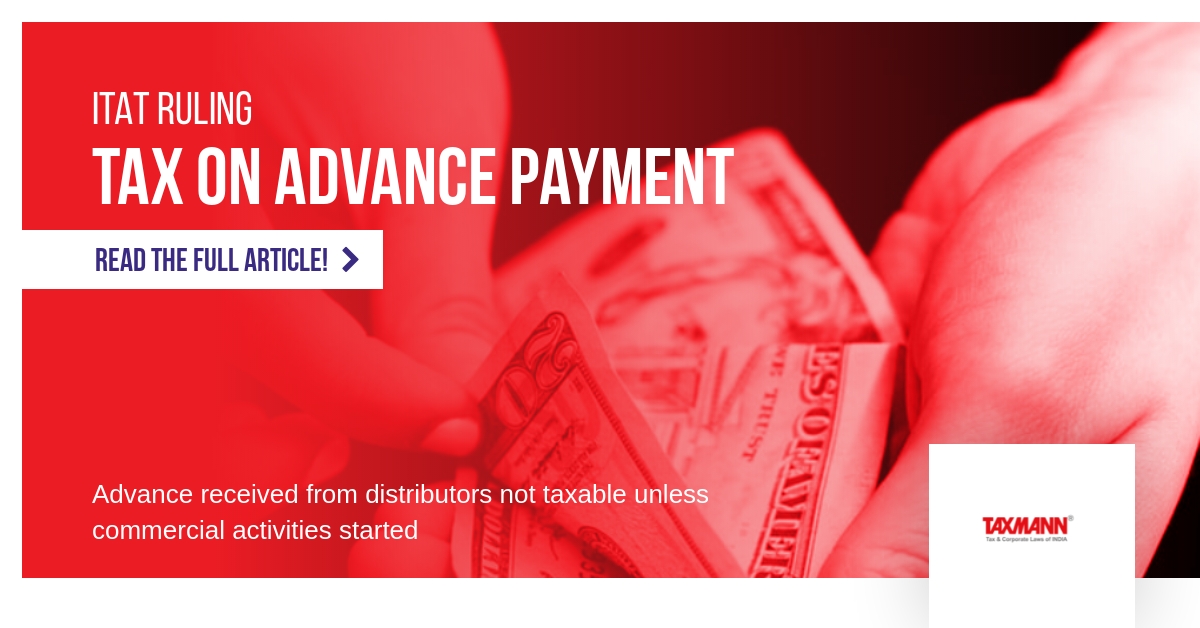Advance received from distributors not taxable unless commercial activities started: ITAT
- News|Blog|Income Tax|
- 3 Min Read
- By Taxmann
- |
- Last Updated on 30 March, 2022

Case Details: Sanvitha Biotechnologies (P.) Ltd. v. DCIT - [2022] 136 taxmann.com 163 (Hyderabad - Trib.)
Judiciary and Counsel Details
-
- Satbeer Singh Godara , Judicial Member and Laxmi Prasad Sahu, Accountant Member
- P. Murali Mohana Rao for the Appellant.
- Y.V.S.T. Sai for the Respondent.
Facts of the Case
The assessee submitted that it had entered into a marketing agreement with company ‘BI’, to sell all animal health products. It would manufacture the product in future with global partner ‘BI’ with conditions as mentioned in the agreement and for the assignment of global exclusive distribution rights for its products. It had received an amount of Rs. 22.50 crores from ‘BI’, which was non-refundable.
The assessee contended that it was foregoing its rights in respect of trademark, fixing of price of the product, and to have incurred expenditure towards the package, export transport and other related expenditure. In this process, the assessee would incur huge losses for a long period and to compensate for those losses; it had received an amount of Rs. 22.50 crores.
However, the AO rejected the assessee’s contention and held that money was received in the business transaction process and thus liable to tax as business income.The CIT(Appeals) also upheld the AO’s order. Aggrieved-assessee filed the instant appeal before the Tribunal.
ITAT Held
The Tribunal held that the crux of the issue is whether the receipt of Rs. 22.50 crores received by the assessee as advance can be treated as business receipt under section 28(i) or not.
It was clear that the assessee had not undertaken any business activity, and he had received only advance for setting off losses for future years, which commence from 1-4-2016. Further, it was clear from the audited financial statements that no commercial activity had been started.
Therefore, the agreement in this regard for treating it as a revenue income cannot arise. On perusal of the agreement, the agreement will be in force when the commercial activity starts. Accordingly, the advance received of Rs. 22.50 crores is not revenue in nature for the year under consideration. Therefore, AO was directed to delete the addition.
Case Review
-
- Siddheshwar Sahakari Sakhar Karkhana Ltd. v. CIT [2004] 139 Taxman 434/270 ITR 1 (SC) (para 11.3) followed.
List of Cases Referred to
-
- Siddheshwar Sahakari Sakhar Karkhana Ltd. v. CIT [2004] 139 Taxman 434/270 ITR 1 (SC) (para 9.6)
- CIT v. Shoorji Vallabhdas & Co. [1962] 46 ITR 144 (SC) (para 9.6)
- CIT v. Lok Housing Construction Ltd. [2016] 70 taxmann.com 2/240 Taxman 1 (SC) (para 9.6)
- Amrutha Power Projects (P.) Ltd. v. ITO [IT Appeal No. 1944 (Hyd.) of 2017, dated 4-8-2020] (para 15)
- CIT v. E-Funds International India [2007] 162 Taxman 1 (Delhi) (para 16)
- Western India Vegetables Products Ltd. v. CIT [1954] 26 ITR 151 (Bom.) (para 17)
- CIT v. Saurashtra Cement & Chemical Industries Ltd. [1973] 91 ITR 170 (Guj.) (para 17.1)
- Sarabhai Management Corpn. Ltd. v. CIT [1976] 102 ITR 25 (Guj.) (para 17.2)
- Carefour WC & C India (P.) Ltd. v. Dy. CIT [2015] 53 taxmann.com 289/228 Taxman 261/[2014] 368 ITR 692 (Delhi) (para 17.3)
- Reliance Gems & Jewels Ltd. v. Dy. CIT [IT Appeal No. 3855 (Mum.) of 2013, dated 28-10-2015] (para 17.4).
Disclaimer: The content/information published on the website is only for general information of the user and shall not be construed as legal advice. While the Taxmann has exercised reasonable efforts to ensure the veracity of information/content published, Taxmann shall be under no liability in any manner whatsoever for incorrect information, if any.

Taxmann Publications has a dedicated in-house Research & Editorial Team. This team consists of a team of Chartered Accountants, Company Secretaries, and Lawyers. This team works under the guidance and supervision of editor-in-chief Mr Rakesh Bhargava.
The Research and Editorial Team is responsible for developing reliable and accurate content for the readers. The team follows the six-sigma approach to achieve the benchmark of zero error in its publications and research platforms. The team ensures that the following publication guidelines are thoroughly followed while developing the content:
- The statutory material is obtained only from the authorized and reliable sources
- All the latest developments in the judicial and legislative fields are covered
- Prepare the analytical write-ups on current, controversial, and important issues to help the readers to understand the concept and its implications
- Every content published by Taxmann is complete, accurate and lucid
- All evidence-based statements are supported with proper reference to Section, Circular No., Notification No. or citations
- The golden rules of grammar, style and consistency are thoroughly followed
- Font and size that’s easy to read and remain consistent across all imprint and digital publications are applied



 CA | CS | CMA
CA | CS | CMA
